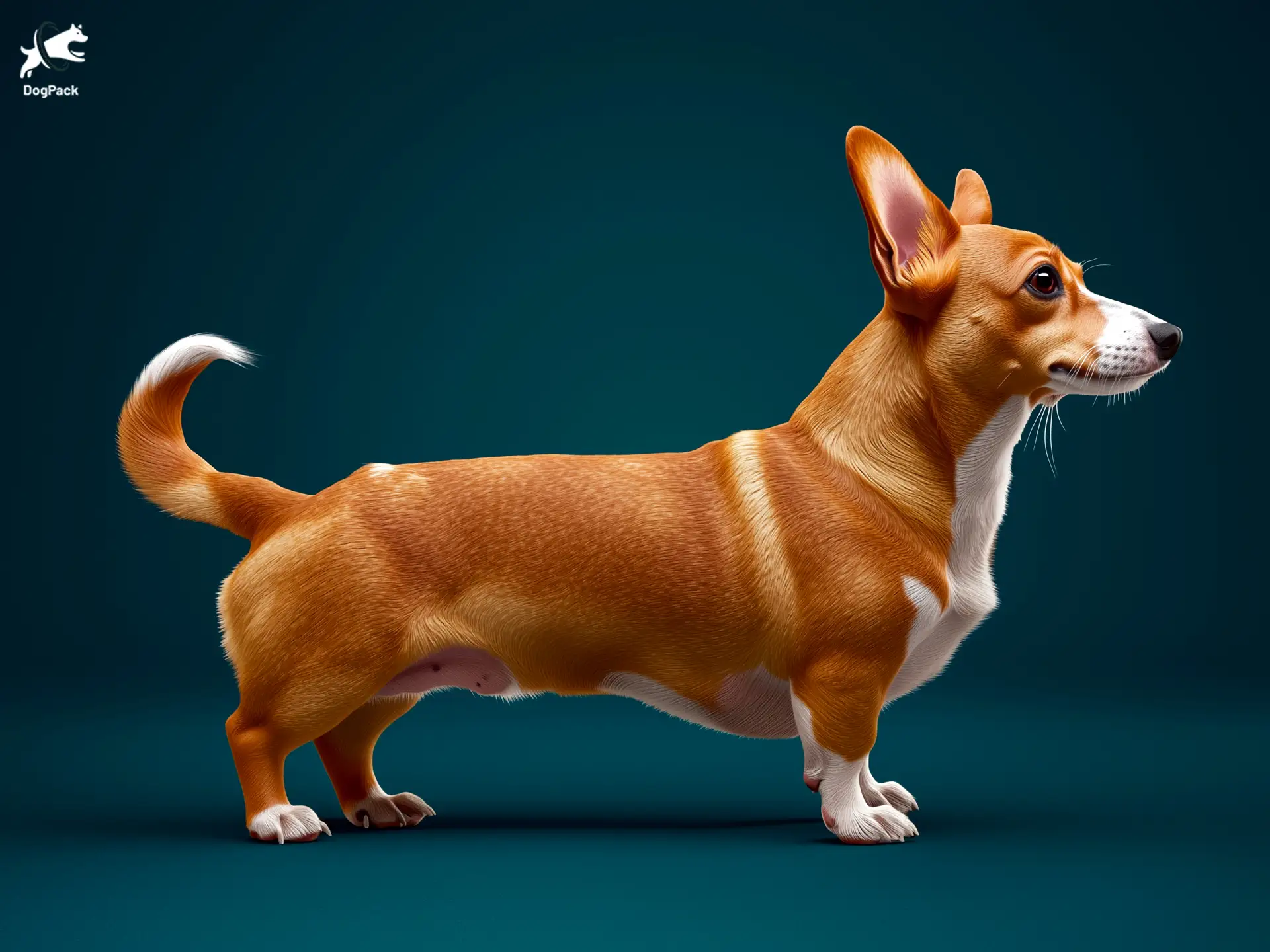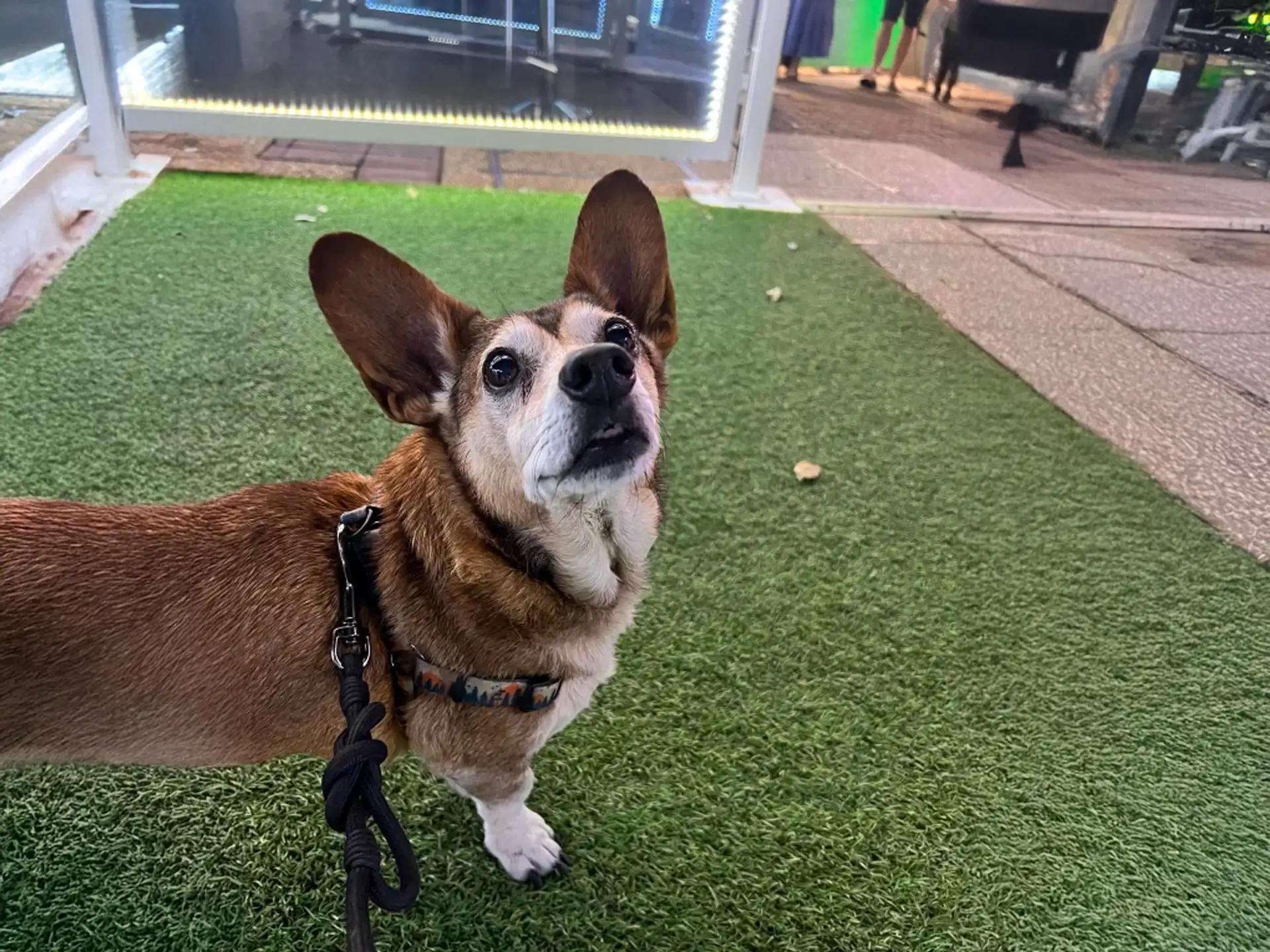Dorgi Dog Breed Info & Overview
The Dorgi, a charming blend of the curious Dachshund and the lively Pembroke Welsh Corgi, is a small dog with a big personality. Known for their playful and affectionate nature, Dorgis are ideal companions for those seeking an energetic, loving friend. With their long bodies and spirited charm, Dorgis bring joy and companionship to any home, making them perfect for families and individuals alike.
Characteristics
Pictures
Breed History
The Dorgi, a mix of the Dachshund and Pembroke Welsh Corgi, may be a newcomer to the dog world, but it’s already made quite a name for itself. This charming hybrid originated in the United Kingdom, with none other than Queen Elizabeth II championing the breed—her Majesty herself owned several Dorgis! Talk about royal pedigree.
Both parent breeds have impressive resumes. Dachshunds, or “badger dogs,” were bred in Germany to hunt tough underground prey, while Corgis were used in Wales as herding dogs, corralling cattle with their short, sturdy frames. Combine these two, and you get a small dog with a big, lively personality and plenty of drive.
Though not recognized by major kennel clubs, Dorgis have become a hit with dog lovers looking for a unique companion. They bring a mix of energy, charm, and loyalty to the table, appealing to families and individuals alike. So, whether they’re hunting hearts or herding affection, Dorgis are here to stay!
Temperament, Personality
Dorgis are small dogs with giant hearts. They’re affectionate, playful, and incredibly social, loving nothing more than to be part of family life. Known for their friendly, people-oriented personalities, these dogs are happiest when they’re the center of attention. Expect plenty of cuddles and maybe a bit of lap-hogging!
But don’t let their sweet nature fool you—Dorgis are smart and sometimes a little stubborn, especially with that dash of Dachshund independence. They’re quick learners but benefit from consistent training to keep any headstrong tendencies in check. Early socialization is essential to help them grow into well-mannered dogs who love being around both people and pets.
These dogs are also naturally alert and may be a bit wary of strangers at first, though they’ll warm up once they see there’s no threat. Dorgis bring a delightful mix of playfulness and protectiveness to any household, making them wonderful companions for families, singles, and seniors alike.
Physical Characteristics
Imagine a small dog with a long body, short legs, and an adorably expressive face—that’s the Dorgi in a nutshell. This compact pup often inherits the Dachshund’s elongated body and the Corgi’s short, sturdy legs. Their ears may be floppy like a Dachshund’s or stand upright like a Corgi’s, giving each Dorgi a unique appearance.
Coat colors vary widely, from solid shades of black and brown to red and even mixed patterns. Some Dorgis display the distinct markings of a Dachshund, while others might have the fluffy, full coat of a Corgi. They typically weigh between 15–28 pounds (7–13 kg) and stand around 9–12 inches (23–30 cm) tall.
Dorgis may be small, but their physical build is robust, making them sturdy enough for playtime and daily adventures. Their eyes are often large and expressive, giving them an endearing look that’s hard to resist. This little dog might have short legs, but it sure makes a big impression!
Health Issues
Like any dog breed, Dorgis have specific health considerations. With their long back and short legs, they’re prone to intervertebral disc disease (IVDD), a common issue among Dachshund mixes. Preventing them from jumping off high surfaces and supporting them when lifting can help protect their spine.
Hip dysplasia can be a concern, too, especially if they inherit it from the Corgi side. Regular vet check-ups, a balanced diet, and maintaining a healthy weight are crucial to minimizing strain on their joints and preventing obesity-related health issues. It’s also a good idea to watch out for eye problems, which can occasionally affect both parent breeds.
Regular screenings and a proactive approach to health can ensure your Dorgi leads a comfortable, happy life. A little extra care goes a long way in keeping this charming hybrid healthy and full of energy.
Grooming Needs
Dorgis are moderate shedders, and regular grooming helps keep their coat in tip-top shape. A weekly brushing session is typically enough to remove loose hairs and maintain a nice shine, though they might need a bit more brushing during seasonal shedding.
Bathing can be done as needed—usually once a month or when they get dirty. Dorgis with floppy ears should have their ears checked and cleaned regularly to prevent infections. Their coats can vary, so some may require more frequent grooming if they have inherited a thicker, fluffier Corgi coat.
Don’t overlook dental care! Brushing their teeth several times a week helps prevent dental issues. Regular nail trims will also keep their paws comfortable and healthy. Overall, Dorgis have manageable grooming needs, making them a relatively low-maintenance choice for dog lovers.
Exercise Requirements
Despite their short legs, Dorgis are surprisingly active! They need around 30–60 minutes of exercise each day, which can include brisk walks, play sessions, and some interactive games like fetch. These little guys might be small, but they’ve got the energy to keep up with more athletic families.
Because of their long backs, high-impact activities like jumping should be limited to avoid strain. Think of them as four-legged explorers—they love sniffing around and exploring, making them ideal walking companions. Mental stimulation is also important, so try puzzle toys or obedience training to keep them engaged.
Whether it’s a jaunt around the neighborhood or a game of hide-and-seek, Dorgis are always up for a bit of fun. Meeting their exercise needs keeps them happy and helps prevent unwanted behavior due to boredom.
Training Tips
Training a Dorgi can be an enjoyable experience, thanks to their intelligence and eagerness to please. Positive reinforcement works wonders with this breed—treats, praise, and gentle guidance will keep them motivated. However, be prepared for the occasional stubborn moment; they get that from their Dachshund side.
Early socialization helps Dorgis become well-adjusted adults. Exposing them to various people, pets, and environments can prevent nervousness around new situations. Puppy classes can be a fantastic way to start, offering structured socialization and training.
Patience and consistency are essential. Avoid harsh methods, as these can lead to fearfulness or stubborn resistance. With the right approach, your Dorgi will blossom into a well-mannered, delightful companion.
Nutrition, Diet
Feeding your Dorgi a high-quality, balanced diet is essential for their health and energy levels. Given their small size, they typically require about 1 to 1.5 cups of dry food per day, split into two meals. Look for a formula rich in protein to support their active lifestyle and muscular build.
Avoid overfeeding, as Dorgis can be prone to obesity, which may lead to joint and back problems. A diet that includes Omega-3 and Omega-6 fatty acids will keep their coat healthy, and supplements like glucosamine can support joint health. Consulting your vet can help fine-tune a diet that meets your Dorgi’s unique needs.
Portion control and regular meal times help maintain a healthy weight. Always ensure fresh water is available, especially after exercise or outdoor play.
Adoption, Breeders
If you’re interested in bringing a Dorgi into your life, consider checking rescue organizations and shelters first, as many lovable hybrids are waiting for homes. Communities like Dorgi Lovers can help you find adoptable Dorgis in your area, providing a great opportunity to give a dog a second chance.
For those who prefer a breeder, ensure they’re reputable and prioritize the health of their dogs. Health clearances for both parent breeds are essential to avoid inherited health issues. Meeting the puppy’s parents can also give you insights into their temperament and size.
Connecting with hybrid or Dorgi-specific clubs can be helpful, offering breeder recommendations and tips on care. Avoid puppy mills and online ads without credible references—reputable breeders will be transparent and passionate about their dogs’ well-being.
Family Pet?
Dorgis are wonderful family dogs! They’re affectionate, playful, and adapt well to a variety of family structures. Kids will love their friendly, lively nature, but younger children should be supervised to ensure gentle handling, especially because of the Dorgi’s long back.
They can live peacefully with other pets if socialized early, making them a great choice for multi-pet households. Their small size is an advantage for families who want a playful but manageable dog that’s easy to care for.
Loyal and charming, Dorgis quickly bond with their human family members. They bring a joyful, spirited presence to any home, making them a delightful addition to families and singles alike.
Right For You?
If you’re searching for a small, energetic dog with loads of personality, the Dorgi could be a perfect match. They suit both families and singles, especially those who can meet their exercise and social needs. Their moderate grooming needs and potential health concerns are important factors to consider.
Dorgis adapt well to apartment living but thrive best in active households. If you’re willing to invest time in training and exercise, this affectionate, playful breed will bring endless joy to your life.
In short, a Dorgi is a fantastic companion for anyone ready to meet their needs and embrace their unique quirks. They’re small dogs with big hearts—and even bigger personalities!
Conclusion
The Dorgi combines the charm of the Dachshund with the herding instincts of the Corgi, resulting in a spirited and affectionate companion. Whether you’re a family or a solo owner, this delightful hybrid can bring laughter and love into your home. With proper care, training, and attention, a Dorgi will be a devoted and joyful friend for years to come.
FAQs
-
Do Dorgis need a lot of grooming?
Dorgis have moderate grooming needs. Weekly brushing helps manage their shedding, and occasional baths keep them fresh. Checking their ears and trimming nails regularly will also maintain their health and appearance.
-
Are Dorgis prone to separation anxiety?
Yes, Dorgis are companion-oriented and may develop separation anxiety if left alone too long. They thrive in homes where someone is around often. Interactive toys or a companion pet can help keep them content when alone.
-
How vocal are Dorgis?
Dorgis may inherit a vocal streak from their Dachshund lineage and may bark at unfamiliar sounds. Early training helps control excessive barking, making them well-suited for quieter homes.
-
What type of diet is best for a Dorgi?
A balanced diet with quality protein is essential for Dorgis. Given their potential for weight gain, portion control and regular feeding times help maintain a healthy weight and prevent obesity-related health issues.
-
Do Dorgis have herding instincts?
Dorgis may display herding instincts due to their Corgi heritage. They sometimes “herd” small children or animals. Training and supervision guide these behaviors positively, especially in multi-pet households.
Breed Ratings
Dorgis are smart and quick learners, making training enjoyable and effective.
They love to play and engage with their families, keeping everyone entertained.
With moderate to high energy, Dorgis need regular exercise to stay happy.
Shedding is moderate; regular brushing helps control loose hair.
They may have a moderate prey drive due to their hunting background.
Grooming is straightforward, requiring regular brushing and occasional baths.
Eager to please, they respond well to positive training methods.
Dorgis prefer company and may experience separation anxiety if left alone too long.
They can be vocal at times but can be trained to minimize excessive barking.
Drooling is minimal, making them relatively tidy companions.
Generally friendly with other dogs when properly socialized.
Health is good but watch for back issues and maintain regular vet visits.














